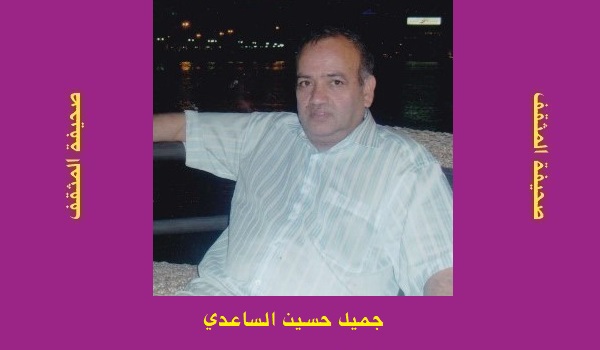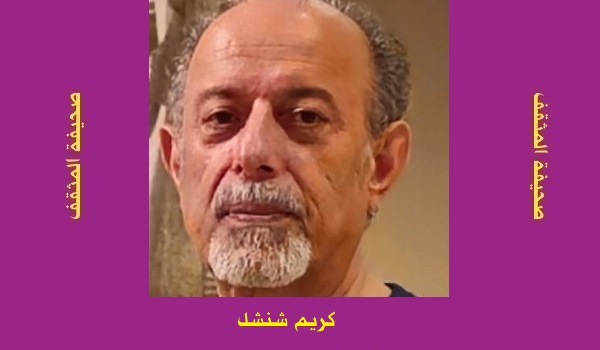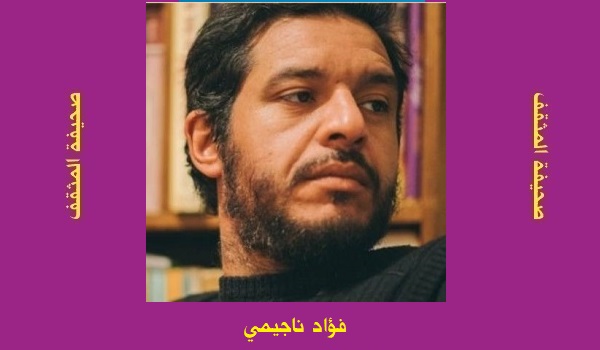ترجمات أدبية
Ali Al-Kasimi: The Boat

by Ali Al-Kasimi
Translated by Hassane Darir (Professor of Translation and Terminology, Cadi Ayyad University, Marrakech) and revised by W Richard Oakes Jr. (PhD-University of Edinburgh, Independent Scholar)
***
A small boat on which my life depended and to which my existence hangs.
It was no different from all the other boats. There was nothing special about it; it was just a small blue boat. A rowboat, without oars, moored in the sandy bay on the beach, protected by a rocky sea-shore from the intermittent restless waves of the sea. Nevertheless, it was constantly swayed by the waves that flowed under and around it, but it did not leave its place, thanks to the heavy anchor that held it in that spot. It may appear smaller or larger due to the ebb and flow. As the tide rose, most of it became covered with water, until only its edge remained visible, but in low tide, the water receded until it was completely visible.
I can't remember when I first saw that boat there. It had been in that part of the bay ever since I began living in this house overlooking this secluded beach. It first caught my eye when I was watching the setting sun in its last moments, its disc sinking little by little into the depths of the sea, at the far horizon, and then completely fading away, except for a few scattered red spots that stained the clear blue sky. The boat was located between me and the setting sun. The transformations of the light were reflected on it, so the side facing me seemed darker, and there appeared something of the white color with which its inside was painted, in harmony with the whiteness of the waves when they hit the rocky sea-shore, or when they embraced the shore to fall into its arms.
At first, I thought it was a fishing boat, but that beach was devoid of fishermen, and I did not see anyone approaching it. It was never removed from its place, as far as I remember. Perhaps it was a recreation boat that someone had put there to have a picnic on holidays, I thought. However, despite my frequent sitting on the balcony of the house overlooking the sea, I had not seen anyone getting on that boat or approaching it.
As time passed, I became accustomed to seeing the boat, just as I was used to seeing the shore's rocks and sand, which no longer constituted an obstacle to my sight, or, as I was accustomed to hearing the roaring of the waves, which ceased to captivate my hearing. The blueness of the boat began to somehow blend in with the blueness of the sea, until it became like a wave among the waves of the sea, and its lines became just infinitesimal drops, tightly attached to each other, like drops of sea water.
Gradually, I no longer noticed the boat, and I no longer paid any attention to it, as if it wasn't there at all. But one day something happened that rekindled my interest in the boat, and its presence took on such a special meaning to me, that whenever I woke up in the morning, I would run to the veranda of the house to make sure it was in its place. Before going to bed in the middle of the night, I would go back to the balcony to take one last look at it. During the day, I used to observe it a lot. Sometimes, I imagined that it was responding to my thoughts or my looks, as if its movements, horizontal at times, vertical at other times, were symbolic signs with comprehensible connotations.
I even suspected that there were spiritual connections between me and the boat, though my mind did not find any acceptable logic in these speculations. How can a spiritual relationship be established between a person and an inanimate object? It is just a set of static wooden planks that had long ago been cut off from trees and that were tightened by solid steel nails. The swaying of the boat was only a tangential movement caused by the waves, not a spontaneous movement due to some rational will. Despite my logical reasoning, a strange feeling gripped me that my existence depended on the presence of that boat in that spot.
I do not know how feelings arise, and I do not know to what extent they are true or false, but that feeling that I had is a real one, put into words, which I uttered in my loneliness. I often used to say: “My existence depends on that boat.” Then I thought: But its existence, too, depends on me. If I had not seen it in that isolated, uninhabited beach, it would not have existed. It is as if I were echoing that absurd line of logic that philosophy students study-- a tree fell in the forest without anyone near it--Did it or did it not make a noise?
What drew my attention to the boat, the first time, was my friend the painter Khalid, or rather his strange behavior. Two years ago, Khaled suggested that he share the residence with me in this house, following the advice of his doctor, who explained to him that the fresh sea air would reduce the asthma attacks that he was suffering, and that wide open spaces would allow him to walk and breathe the air, which would relieve the arterial occlusion disease in his heart. I accepted his suggestion, because I thought that his living with me in the house would ease the severity of my loneliness, in addition to building upon the bonds of affection that have bound us together for many years.
Khaled was taciturn, spending most of his time on the balcony of the house, meditating a lot, gazing at the sea, reading a book, or moving his brush with small, careful strokes on a piece of cloth fixed to the easel. His drawings were dominated by scenes of the sea, the beach, waves and clouds, in predominantly dark colors. His scenes were devoid of the sun. He told me one day: “I'll draw that boat before it leaves.”
I said: - “It's always there, and I look forward to seeing your drawing of it.”
Days, weeks, and months slipped by without Khaled drawing the boat.
Khaled often sat on the balcony, more meditating than painting or reading. At first, I thought he was contemplating the sea, staring at its waves, looking forward to the sunset, or following the movement of the clouds in the sky. But later it seemed to me that he was staring at the boat, as if his eyes had been tied to it by invisible wires, or as if he was thinking about something that worried him and filled him with fear. I thought to myself that he might fear death because of his advanced age and his difficult health condition. I laughed at his fears inside myself, because I fully believe in predestination. Death is not related to human health. How many a young person passed away while in full physical strength, and how many patients outlived their doctors and their visitors!
Khaled didn't tell me much about the boat, except to indicate his intention to paint it, so I didn't ask him why he was staring at it, as I feared I might be mistaken. Besides, he was taciturn and very thoughtful, and I was afraid to interrupt his chain of thoughts.
One day, Khaled finished drawing a scene in which the rocks of the gulf in which the boat is anchored appear when the waves hit them, so that their drops fly and turn into a pyramidal curtain of white grains, but the boat did not appear in that painting. When he had finished putting the finishing touches on that painting, he hung it on the wall and gently pulled me back a little, while contemplating the painting and said to me: - “What do you think of it?”
I said in a tone that I tried to make it sound sincere and natural: - “Really great, but missing the boat.”
He remained silent and did not comment, so I did not continue the discussion on the subject.
One day, Khaled completed a painting in which successive thick black clouds seemed to move quickly towards the bay, as frightening warplanes pouncing one by one on the rocky sea-shore near the beach, exactly on the spot where that boat was anchored. The painting was designed so that the viewer appeared to be under the aerial attack. But the boat itself was not shown in that painting. Khaled put the painting on the table, leaning against the wall. He asked:
- “Is the perspective clear?”
- The movement of clouds and waves is perfectly clear, as if one were in the eye of the storm. But you forgot the boat.
He hesitated a little before saying: - “I will draw it one day.”
From time to time, Khalid felt signs of a heart attack; a pain in the chest that quickly spread to the jaw and left shoulder, a rise in the palpitations of the heart, a difficulty in breathing. He rushed to take a pill, laid on his back on the couch in the balcony; I rushed to call his doctor, and then I gently massaged his chest.
I passed by him one day. He was lying on the sofa in the balcony. He was staring at the sea and so he did not notice that I was near him. I heard him say as if he were talking to someone: “I will leave the day you leave, or you will leave the day I leave!” At first, I thought he was addressing me, but when he added: "Your painting is of no use. The original will leave and the image will remain", I, then, realized he was talking to the boat.
I quietly withdrew without him knowing I was there, and I thought to myself: “He must be sensing that death is approaching, which makes him an easy prey for obsessions. Therefore, he makes his life dependent on the presence of the boat in the bay.” This reminded me about a story by the American writer O. Henry that concerns a poor girl who was betrayed by her lover, so she fell ill to the point of death. She did not even have the price of medicine, so her neighbor, the old painter, volunteered to buy her the medicine. While she was in her bed, she watched the autumn wind playing with the leaves of a tree branch in the street leaning against the window of her room and causing them to fall one by one, until there was only one leaf left in the branch resting on the glass of her window. While hallucinating because of fever, the girl was repeating that the days of her life were falling like those leaves fell from the branch, and that she would die when the last leaf fell. But, when she opened her eyes in the morning, she saw the sun shining warmly through the window. The leaf remained in its place and had even grown greener and more lustrous. Little buds had opened beside it, and her hope for her life returned to her. She did not know that her old neighbor, the painter, had spent part of the night in the rain and wind drawing the leaf and buds on her window panes, and that at dawn he had fallen dead from the cold.
I, too, thought of a way to ensure that the boat would remain in the bay, so that hope would blossom in the soul of my friend Khaled, for the continuation of the heartbeat depends on the pulse of hope in the soul. I didn’t know what to do to ensure the boat would stay anchored in the bay. The boat is there and I don't know its owner. Furthermore, I'm not good at painting on the water.
Thus, months passed. One morning, Khaled was late getting out of bed, as I finished making breakfast, and he didn't join me at the usual time. I put the tray on the table on the balcony and went to his room. He was still in his bed. I didn’t hear his breathing. I approached him, placing my hand on his wrist. It was horribly cold. He must have died of a heart attack that struck him at night, without me being able to save him or even support him at the last moments. He avoided bothering others, and he has left this world without disturbing anyone.
Trying to pull myself out of the clutches of sadness and astonishment, I spontaneously hurried to the balcony and looked out over the bay. Surprisingly, I did not see the boat there. The boat was gone. The disappearance of the boat astonished me, and put a little apprehension in my heart.
In the evening when I returned from the burial in the cemetery, a boat was in its usual place.
****
...................................
* ترجمة لقصة: القارب للقاص علي القاسمي من كتاب: آوان الرحيل
This short story is(القارب) a translation of by Ali Al-Kasimi. It is the tenth in the short story collection Time to Leave, under translationآوان الرحيل .







